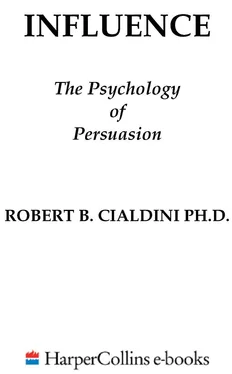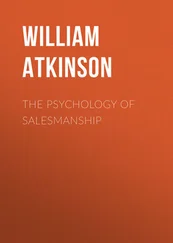The extent to which even an unwanted favor, once received, can produce indebtedness is aptly illustrated in the soliciting technique of the Hare Krishna Society. During systematic observation of the airport soliciting strategy of the Krishnas, I have recorded a variety of responses from target persons. One of the most regular occurs as follows. An airport visitor—a businessman, let's say—is hurriedly walking along through a densely peopled area. The Krishna solicitor steps in front of him and hands him a flower. The man, reacting with surprise, takes it. 7Almost immediately, he tries to give it back, saying that he does not want the flower. The Krishna member responds that it is a gift from the Krishna Society and that it is the man's to keep... however, a donation to further the Society's good works would be appreciated. Again the target protests, "I don't want this flower. Here, take it." And again the solicitor refuses, "It's our gift to you, sir." There is visible conflict on the businessman's face. Should he keep the flower and walk away without giving anything in return, or should he yield to the pressure of the deeply ingrained reciprocity rule and provide a contribution? By now, the conflict has spread from his face to his posture. He leans away from his benefactor, seemingly about to break free, only to be drawn back again by the pull of the rule. Once more his body tilts away, but it's no use; he cannot disengage. With a nod of resignation, he fishes in his pocket and comes up with a dollar or two that is graciously accepted. Now he can walk away freely, and he does, "gift" in hand, until he encounters a waste container—where he throws the flower.
Purely by accident, I happened to witness a scene that demonstrates that the Krishnas know very well how frequently their gifts are unwanted by the people who receive them. While spending a day observing a soliciting Krishna group at Chicago's O'Hare International Airport a few years ago, I noticed that one of the group members would frequently leave the central area and return with more flowers to resupply her companions. As it happened, I had decided to take a break just as she was leaving on one of her supply missions. Having nowhere to go, I followed. Her journey turned out to be a garbage route. She went from trash can to trash can beyond the immediate area to retrieve all the flowers that had been discarded by Krishna targets. She then returned with the cache of recovered flowers (some that had been recycled who knows how many times) and distributed them to be profitably cycled through the reciprocation process once more. The thing that really impressed me about all this was that most of the discarded flowers had brought donations from the people who had cast them away. The nature of the reciprocity rule is such that a gift so unwanted that it was jettisoned at the first opportunity had nonetheless been effective and exploitable.
The ability of uninvited gifts to produce feelings of obligation is recognized by a variety of organizations besides the Krishnas. How many times have each of us received small gifts through the mail—personalized address labels, greeting cards, key rings—from charity agencies that ask for funds in an accompanying note? I have received five in just the past year, two from disabled veterans' groups and the others from missionary schools or hospitals. In each case, there was a common thread in the accompanying message. The goods that were enclosed were to be considered a gift from the organization; and any money I wished to send should not be regarded as payment but rather as a return offering. As the letter from one of the missionary programs stated, the packet of greeting cards I had been sent was not to be directly paid for, but was designed "to encourage your kindness." If we look past the obvious tax advantage, we can see a reason why it would be beneficial for the organization to have the cards viewed as a gift instead of merchandise: There is a strong cultural pressure to reciprocate a gift, even an unwanted one; but there is no such pressure to purchase an unwanted commercial product.
The Rule Can Trigger Unfair Exchanges
There is yet one other feature of the reciprocity rule that allows it to be exploited for profit. Paradoxically, the rule developed to promote equal exchanges between partners, yet it can be used to bring about decidedly unequal results. The rule demands that one sort of action be reciprocated with a similar sort of action. A favor is to be met with another favor; it is not to be met with neglect, and certainly not with attack. But within the similar-action boundaries, considerable flexibility is allowed. A small initial favor can produce a sense of obligation to agree to a substantially larger return favor. Since, as we have already seen, the rule allows one person to choose the nature of the indebting first favor and the nature of the debt-canceling return favor, we could easily be manipulated into an unfair exchange by those who might wish to exploit the rule.
Once again, we can turn to the Regan experiment for evidence. Remember in that study that Joe gave one group of subjects a bottle of Coca-Cola as an initiating gift and later asked all subjects to buy some of his raffle tickets at twenty-five cents apiece. What I have so far neglected to mention is that the study was done in the late 1960s, when the price of a Coke was a dime. The average subject who had been given a ten-cent drink bought two of Joe's raffle tickets, although some bought as many as seven. Even if we look just at the average subject, though, we can tell that Joe made quite a deal. A 500 percent return on investment is respectable indeed!
But in Joe's case, even a 500 percent return amounted to only fifty cents. Can the reciprocity rule produce meaningfully large differences in the sizes of the exchanged favors? Under the right circumstances, it certainly can. Take, for instance, the account of a student of mine concerning a day she remembers ruefully:
About one year ago, I couldn't start my car. As I was sitting there, a guy in the parking lot came over and eventually jump-started the car. I said thanks, and he said you're welcome; as he was leaving, I said that if he ever needed a favor to stop by. About a month later, the guy knocked on my door and asked to borrow my car for two hours as his was in the shop. I felt somewhat obligated but uncertain, since the car was pretty new and he looked very young. Later, I found out that he was underage and had no insurance. Anyway, I lent him the car. He totaled it.
How could it happen that an intelligent young woman would agree to turn over her new car to a virtual stranger (and a youngster at that) because he had done her a small favor a month earlier? Or, more generally, why should it be that small first favors often stimulate larger return favors? One important reason concerns the clearly unpleasant character of the feeling of indebtedness. Most of us find it highly disagreeable to be in a state of obligation. It weighs heavily on us and demands to be removed. It is not difficult to trace the source of this feeling. Because reciprocal arrangements are so vital in human social systems, we have been conditioned to be uncomfortable when beholden. If we were to ignore breezily the need to return another's initial favor, we would stop one reciprocal sequence dead and would make it less likely that our benefactor would do such favors in the future. Neither event is in the best interests of society. Consequently, we are trained from childhood to chafe, emotionally, under the saddle of obligation. For this reason alone, then, we may be willing to agree to perform a larger favor than we received, merely to relieve ourselves of the psychological burden of debt.
But there is another reason as well. A person who violates the reciprocity rule by accepting without attempting to return the good acts of others is actively disliked by the social group. The exception, of course, is when the person is prevented from repayment by reasons of circumstance or ability. For the most part, however, there is a genuine distaste for individuals who fail to conform to the dictates of the reciprocity rule. Moocher and welsher are unsavory labels to be scrupulously shunned. So undesirable are they that we will sometimes agree to an unequal exchange in order to dodge them.
Читать дальше












